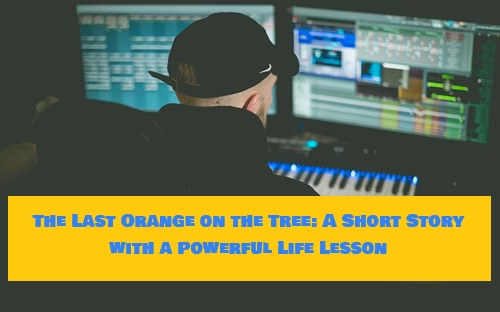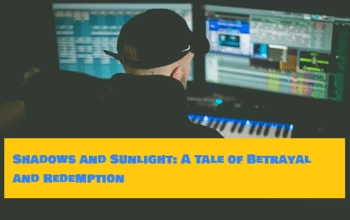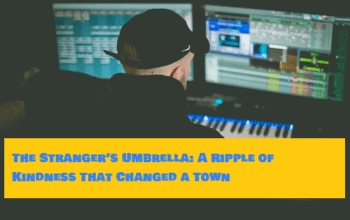The Last Orange on the Tree: A Short Story with a Powerful Life Lesson
Sometimes, the smallest stories carry the greatest lessons. In a world obsessed with complexity, it’s easy to forget that wisdom often comes in the simplest forms. This is the tale of an old farmer, a stubborn young boy, and the last orange on a tree—a short story that reveals a powerful life lesson about gratitude, patience, and the true meaning of abundance.
Chapter 1: The Orchard and the Boy
In a quiet village nestled between two rolling hills lived a boy named Leo. His family was neither poor nor wealthy, but Leo was known to complain about everything. If dinner was rice and vegetables, he wanted meat. If the sun shone too bright, he begged for clouds. Nothing ever seemed to be enough.
Leo’s grandfather, Old Man Tiber, was a wise and weathered farmer who owned the last orange orchard in the village. The trees were aging, and their fruit was not as plentiful as before, but Tiber still cherished each orange like a treasure.
Every weekend, Leo would be sent to help his grandfather on the farm. But instead of helping, Leo usually wandered off, sat under the trees, and grumbled about how boring it all was.
“I wish we had a PlayStation instead of these dumb trees,” Leo once muttered.
Tiber simply smiled, wiping sweat from his brow. “One day, you’ll understand what these trees teach.”
Chapter 2: The Storm That Changed Everything
One summer, a massive storm struck the village. It tore off rooftops, flattened crops, and flooded the roads. When Leo and his family visited the orchard days later, devastation met their eyes.
All but one tree had been uprooted. And on that tree hung a single orange.
Leo stared in disbelief. “That’s it? One orange? All this work, all these years… and now just one?”
Tiber approached the tree, his face calm but serious. “Yes, just one. But maybe that’s all we need.”
He gently picked the orange, wiped it with his shirt, and handed it to Leo.
“Eat it.”
Leo looked confused. “What? Shouldn’t we save it? Sell it?”
Tiber shook his head. “No. It’s not the fruit I want you to keep. It’s the lesson inside.”
Chapter 3: The Taste of Awareness
Leo reluctantly peeled the orange. Its skin was thinner than usual, and the fruit inside glowed a soft golden hue. He took a bite—and something unexpected happened.
It was the sweetest, juiciest, most vibrant orange he had ever tasted.
He looked up, surprised. “How is it so good?”
Tiber chuckled. “That tree knew it had one last chance to give its best. No distractions. No second chances. Just one orange, one purpose.”
Leo slowly ate the rest of the orange in silence, savoring every segment. For the first time in his life, he didn’t take the taste for granted.
Chapter 4: Lessons from the Last Orange
After that day, Leo began to change. He no longer grumbled about helping on the farm. He listened more, watched more, and spoke less. When he ate, he chewed slowly. When he was given something, he said thank you—even if it was just a slice of bread or a cup of water.
One afternoon, Leo asked, “Grandpa, why did that orange taste better than any I’ve ever had?”
Tiber replied, “Because you didn’t rush it. You didn’t expect it. You respected it.”
Leo pondered this.
“You see,” Tiber continued, “we live in a world where people have too much and appreciate too little. The more we chase, the less we enjoy. But when you’re given one chance—one orange—you see its value. You give it your full attention. And that’s where life’s flavor hides.”
Chapter 5: The Return of the Orchard
Inspired by the lesson of the last orange, Leo began helping his grandfather replant the orchard. One tree at a time, with patience and care, they restored the farm. Villagers joined in, inspired by Leo’s transformation.
Years passed. The trees flourished again. But Leo never forgot that single orange. He carried a dried peel of it in his notebook as a reminder.
One day, he shared the story at his school. Then he wrote a book. The story spread online, translated into different languages, taught in classrooms across the world.
The orchard became a place of learning, meditation, and nature walks. Not just a farm—but a living symbol of gratitude and presence.
The Moral of the Story
True abundance is not about having everything. It’s about appreciating the one orange you do have.
In a world driven by consumerism, instant gratification, and constant comparison, this story is a call back to basics. It reminds us that joy doesn’t come from more—it comes from meaning.
We’re so used to chasing the next thing that we miss what’s already in front of us. A meal shared with family. A sunset on a quiet evening. A conversation with someone who cares. Or even something as small as the sweetness of a single orange.
The lesson is simple: When we slow down, appreciate what we have, and live in the present, life reveals its richest flavors.
Takeaways for Daily Life
- Practice Gratitude: Start each day by listing three things you’re thankful for. Even on bad days, there’s always something worth appreciating.
- Be Present: When you eat, eat. When you listen, really listen. Multitasking steals the flavor from life’s moments.
- Stop Comparing: The grass isn’t greener elsewhere—it’s green where you water it. Focus on your own orchard.
- Less is More: Simplify. Whether it’s your possessions, your calendar, or your thoughts, space allows clarity.
- Give Your Best, Always: Just like the tree that gave one perfect orange, do your best in everything—even if it’s just once. The impact might last a lifetime.
Final Words
The story of Leo and the last orange is not about farming. It’s about life.
It’s about waking up from the trance of wanting more, and realizing what we already have is enough. More than enough, actually—if we choose to see it.
So, the next time you hold something simple—a cup of tea, a quiet moment, a hug—pause.
Taste it like it’s the last orange on the tree.



